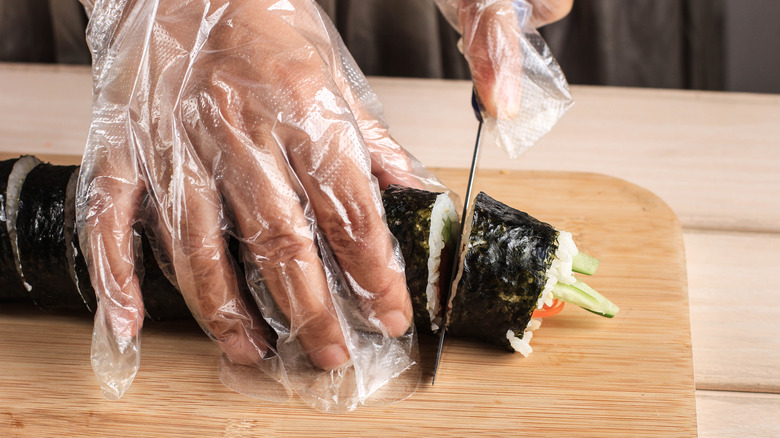The Inspiration Behind David Chang's Spin On Korean Rice Rolls
You may have tried kimbap — Korean rice rolls made with seaweed — that has been prepared for you at restaurants. Or maybe you've tried to make them for yourself at home. But you may not have had the pleasure of tasting renowned chef David Chang's version, which have a meaningful origin story. Chang borrowed from a dish he enjoyed at a South Korean temple to inform his take on the traditional recipe. Chang recalls eating edamame with walnuts that were sweetened with molasses and he's brought this memorable flavor combination into his own unique slices of kimbap rice rolls.
While many rice rolls are often served cold, Chang's sweeter version can be served warm and be presented not only as part of a lunch or dinner meal but also plated as a surprise dessert. Plus, if you have any crumble pieces left over after making Chang's version of the rice roll recipe, you can enjoy eating molasses-flavored walnuts and edamame as a snack the next day.
David Chang's take on rice rolls converts memories into a recipe
Chang has taken ingredients that hold a special place in his memories and made a filling to wrap up in rolls of rice and seaweed. Along with cut pieces of carrots and pickled radish, Chang folds chopped walnuts, shelled edamame, and a few spoonfuls of molasses into his recipe. To make the filling, he cooks the walnuts over high heat with molasses, soy sauce, and edamame until sticky paste forms. To finish the sweet crunch, Chang sprinkles in sesame seeds for added texture and a delicate nutty flavor.
Once the mixture has cooled, the nutty spread can be placed onto a sheet of rice-covered nori that is also layered with shiso leaves, daikon. When cut neatly into pieces and served with soy sauce, this is a dish that may even form memories of your own — and will certainly have you reaching for the next bite.

